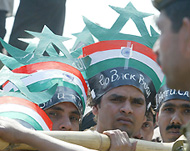Protests as Bush starts India visit
Tens of thousands of Indians have joined demonstrations across the country against the visit by US President George Bush.

Groups representing Muslims, communists and survivors of the Bhopal disaster in 1984 held protests hours before Bush’s arrival in New Delhi on Wednesday.
Bush’s three-day visit to the world’s largest democracy, which is also Asia’s third-largest economy, has raised expectations in India as it sheds its socialist baggage and turns to the West to help it become a regional power.
But it has also drawn the ire of leftist and Muslim groups who staged large protests in several cities across the country against Bush’s policies.
Bush landed at Indira Gandhi international airport early evening after flying in from a surprise visit to Afghanistan.
Earlier about 100,000 Muslim men, many of them wearing prayer caps, had gathered in the heart of the Indian capital shouting anti-Bush slogans.
“Go back, Bush”, “Bush is a killer”, “Bully Bush, buzz off”, “Bush, stop the ambush”, they shouted as hundreds of policemen in riot gear kept watch.
“The people of the country do not want this killer of innocent men, women and children to come here,” one protester said.
 |
|
Many Indian Muslims made it clear |
In the eastern city of Kolkata, a leftist stronghold, about 25,000 communist supporters converged on the city centre to take part in a public meeting organised by the “Committee Against Bush Visit”.
In a statement, the committee said: “Under President Bush, the US continues to occupy Iraq and oppress its people. It threatens Syria and has targeted Iran on the issue of its nuclear programme.
“The Indian government is shamefully succumbing to US imperialist pressures.”
Elsewhere, about 200 student communist activists burnt a straw effigy of Bush in the southern IT hub of Bangalore.
Bhopal protest
In the city of Bhopal meanwhile survivors of the 1984 gas tragedy also marched on Wednesday, shouting “Killer of Bhopal, Hiroshima, Iraq, Afghans, go back”.
About 100 marchers demanded justice for the victims of 40 tonnes of lethal methyl isocyanate gas that seeped into Bhopal from a Union Carbide plant just before midnight on 2 December, 1984.
More than 3500 people died immediately from the gas leak, but the toll has since climbed to more than 15,000, according to government figures.
Bhopal rights activists say the real toll is double that while Amnesty International estimated last year that between 22,000 and 25,000 people had died as a result of the tragedy.
Nuclear deal
Washington and New Delhi hope Bush and Manmohan Singh, the Indian prime minister, will clinch a landmark civilian nuclear co-operation deal, seen as the centrepiece of the visit, at their talks on Thursday.
The deal, agreed in principle last July when Singh visited Washington, has run into trouble over differences on nuclear-armed India‘s plan to separate its military and civilian atomic plants to prevent proliferation, a key requirement.
However, both sides have tried to play down expectations even as they continue to discuss the number of reactors India will declare as civilian and open them up for international inspections.
Ahead of the president’s arrival, Singh said in an interview to a US television channel, that clinching the deal during the visit would be “a great contribution of President Bush to ending India‘s isolation from the world nuclear order.”
India has refused to join the Nuclear Non-Proliferation Treaty calling it discriminatory, leading to its isolation.